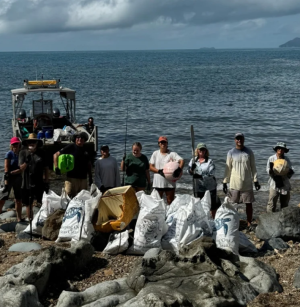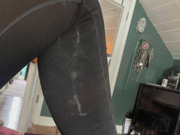Beachgoers Shocked by 200kg Discovery—What Every Aussie Needs to Know Before Their Next Visit
By
Danielle F.
- Replies 0
Australia’s Whitsunday Islands are the stuff of postcards—crystal-clear waters, vibrant coral reefs, and sun-drenched beaches that draw visitors from every corner of the globe. But beneath the surface of this tropical paradise, a growing crisis is quietly unfolding, and it’s one that affects us all.
Last week, a group of dedicated volunteers from Eco Barge Clean Seas, a non-profit based in Airlie Beach, made a grim discovery: a staggering 209 kilograms of rubbish collected from just one beach—Mackerel Bay on Hook Island. And if that wasn’t enough, a follow-up trip just days later netted another 167 kilograms of marine debris. That’s nearly 400 kg of rubbish in less than a week, all washed up on the shores of one of our most iconic holiday destinations.
A Hidden Crisis in Paradise
While most of us head to the Whitsundays to relax, snorkel, and soak up the sun, few realise just how much rubbish is lurking out of sight. According to Libby Edge, founder of Eco Barge Clean Seas, there are 40 to 45 'hotspot' beaches in the Whitsundays where pollution—mainly plastic—constantly washes ashore, driven by strong southeast winds. The most common finds? Hard bits of plastic broken off from larger items, and hundreds of thousands of bottle top lids.
'We average around about 40 trips a year, and that’s just us staying on top of newly arriving marine debris,' Libby explained. Despite increased awareness since the group’s founding in 2009, she says the problem hasn’t improved much. In fact, this week the group hit a sobering milestone: 300,000 kilograms of rubbish collected from the Whitsundays alone, thanks to the efforts of 13,000 volunteers.
Why Should We Care?
It’s easy to think, 'Out of sight, out of mind.' But the reality is that what happens on land doesn’t stay on land. Rubbish dumped anywhere—whether it’s a city street, a country road, or a remote bush track—can eventually find its way into our rivers and oceans. Once there, it poses a deadly threat to marine life. Turtles, for example, are particularly vulnerable. After repeated cyclones wiped out much of their food source, Libby noticed turtles in the reefs were struggling. This led her to launch the Whitsunday Turtle Rescue Centre, which has since cared for 272 injured or sick turtles—many of them victims of plastic pollution.
The Ripple Effect: How Litter Impacts Us All
Plastic pollution isn’t just an eyesore; it’s a national crisis. Microplastics are now being found in the fish we eat, the water we drink, and even the air we breathe. Discarded fishing gear entangles dolphins, turtles, and seabirds. Larger pieces of plastic break down into tiny fragments, which are then ingested by marine animals—often with fatal consequences.
And it’s not just the Whitsundays. From Bondi to Broome, Australia’s beaches are under siege from plastic pollution. The problem is so widespread that it’s estimated there are now more pieces of plastic in the ocean than there are stars in the Milky Way!
What Can We Do?
It’s easy to feel overwhelmed by the scale of the problem, but as Libby says, 'At one point, someone held that plastic item and didn’t dispose of it correctly—it shouldn’t be in the ocean.' Every piece of rubbish picked up is one less hazard for our wildlife and one step closer to cleaner beaches.
Here are a few simple ways you can help:
Your Turn: Have Your Say!
Have you ever come across rubbish on your favourite beach or waterway? Do you have tips for reducing plastic waste or stories about local clean-up efforts? We’d love to hear from you! Share your thoughts and experiences in the comments below—let’s inspire each other to keep Australia’s beaches beautiful for generations to come.

And remember, every little action counts. Together, we can turn the tide on plastic pollution.
Last week, a group of dedicated volunteers from Eco Barge Clean Seas, a non-profit based in Airlie Beach, made a grim discovery: a staggering 209 kilograms of rubbish collected from just one beach—Mackerel Bay on Hook Island. And if that wasn’t enough, a follow-up trip just days later netted another 167 kilograms of marine debris. That’s nearly 400 kg of rubbish in less than a week, all washed up on the shores of one of our most iconic holiday destinations.
A Hidden Crisis in Paradise
While most of us head to the Whitsundays to relax, snorkel, and soak up the sun, few realise just how much rubbish is lurking out of sight. According to Libby Edge, founder of Eco Barge Clean Seas, there are 40 to 45 'hotspot' beaches in the Whitsundays where pollution—mainly plastic—constantly washes ashore, driven by strong southeast winds. The most common finds? Hard bits of plastic broken off from larger items, and hundreds of thousands of bottle top lids.
'We average around about 40 trips a year, and that’s just us staying on top of newly arriving marine debris,' Libby explained. Despite increased awareness since the group’s founding in 2009, she says the problem hasn’t improved much. In fact, this week the group hit a sobering milestone: 300,000 kilograms of rubbish collected from the Whitsundays alone, thanks to the efforts of 13,000 volunteers.
Why Should We Care?
It’s easy to think, 'Out of sight, out of mind.' But the reality is that what happens on land doesn’t stay on land. Rubbish dumped anywhere—whether it’s a city street, a country road, or a remote bush track—can eventually find its way into our rivers and oceans. Once there, it poses a deadly threat to marine life. Turtles, for example, are particularly vulnerable. After repeated cyclones wiped out much of their food source, Libby noticed turtles in the reefs were struggling. This led her to launch the Whitsunday Turtle Rescue Centre, which has since cared for 272 injured or sick turtles—many of them victims of plastic pollution.
The Ripple Effect: How Litter Impacts Us All
Plastic pollution isn’t just an eyesore; it’s a national crisis. Microplastics are now being found in the fish we eat, the water we drink, and even the air we breathe. Discarded fishing gear entangles dolphins, turtles, and seabirds. Larger pieces of plastic break down into tiny fragments, which are then ingested by marine animals—often with fatal consequences.
And it’s not just the Whitsundays. From Bondi to Broome, Australia’s beaches are under siege from plastic pollution. The problem is so widespread that it’s estimated there are now more pieces of plastic in the ocean than there are stars in the Milky Way!
What Can We Do?
It’s easy to feel overwhelmed by the scale of the problem, but as Libby says, 'At one point, someone held that plastic item and didn’t dispose of it correctly—it shouldn’t be in the ocean.' Every piece of rubbish picked up is one less hazard for our wildlife and one step closer to cleaner beaches.
Here are a few simple ways you can help:
- Pick up litter: Even if it’s not yours, every bit helps. Next time you’re at the beach or walking along a river, take a bag and collect any rubbish you see.
- Reduce single-use plastics: Bring your own reusable bags, bottles, and containers.
- Get involved: Join a local clean-up group or volunteer with organisations like Eco Barge Clean Seas.
- Spread the word: Talk to friends and family about the impact of plastic pollution and encourage them to do their bit.
Your Turn: Have Your Say!
Have you ever come across rubbish on your favourite beach or waterway? Do you have tips for reducing plastic waste or stories about local clean-up efforts? We’d love to hear from you! Share your thoughts and experiences in the comments below—let’s inspire each other to keep Australia’s beaches beautiful for generations to come.
Key Takeaways
- Volunteers recently removed more than 200 kg of rubbish from Mackerel Bay in the Whitsunday Islands, with another 167 kg collected just days later, highlighting the scale of marine pollution in the area.
- Despite growing awareness and the efforts of groups like Eco Barge Clean Seas, large amounts of plastic pollution — including bottle tops and broken plastic pieces — continue to wash up on the Whitsundays’ beaches.
- Since 2009, the non-profit Eco Barge Clean Seas has collected a staggering 300,000 kg of rubbish from the Whitsunday Islands, with help from 13,000 volunteers, but the issue of aquatic pollution persists.
- Aussies are being urged to pick up any rubbish they find at the beach or river — even if it’s not their own — to help protect marine life and prevent plastic waste from entering the ocean.








